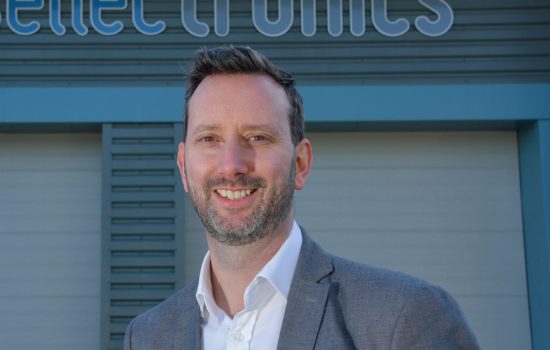

Job Title: Managing Director
Company: Sellectronics Ltd
What is your background and how did you come to be in your present role?
My first job out of university was in the design engineering department at Princess Yachts. I worked on several different projects during that process, before eventually following a boat from the R&D department all the way through to production.
I didn’t have any production experience at that point, but I stayed on that side of the business before becoming a manufacturing engineer, and then eventually production manager for that boat line. It was at that point I switched from engineering and into production management.
I then went to work for a fast moving consumer goods company, and also with some consultants that had spent time with Toyota. This was a particularly interesting career path so I applied for a junior consultancy role with the Manufacturing Advisory Service. I worked for them for several years, before moving into their commercial consultancy arm within the South West Manufacturing Advisory Service, focusing on lean manufacturing and Six Sigma strategy.
I’d known of Sellectronics for a long time and had always kept in touch. Over the last few years, the company has had a huge amount of growth, particularly coming out of the pandemic. While considering the future plans for the business the two owners approached me about coming in and taking the reins. That was two and a half years ago, and it’s been a really great experience.
It’s been challenging of course, particularly coming from a consultancy role, where I was just advising businesses on the best way of doing something. I’m now having to do it myself, but it’s going well.
A really big win for us in the last 12 months was to win UK SME Manufacturer of the Year with Make UK, which was really great accolade. We’ve been involved in a lot of change on the digital manufacturing side as well; trying to digitise processes etc.
What has been your greatest challenge so far in your career?
The transition from consultancy into a real job. I’ve done senior management roles previously, but jumping in as MD was definitely a challenge. Everyone talks about best practice, but the reality is that it takes time to get that in place. It’s means change for the staff, and you’ve got to deal with the people side of the business far more – trying to get the workforce on board with the direction the business is heading.
What has been your greatest achievement so far in your career?
Historically, the business never really got itself out there, and didn’t do a huge amount of marketing, attend wider networking events or get involved with clusters and membership groups. So, on a personal level I’ve been pushing that in an effort to bring some new customers on board.
Certainly winning the award with Make UK has been a highlight for us as a business. When we were doing the application, we looked at the amount of change that we had put in place. In the last few years we’ve achieved our AS9100 qualification as well our JOSCAR approval and Cyber Essentials Plus. We’ve done a variety of different things within the business to get the right accreditation so that we can supply into the bigger OEMs in defence and aerospace.
When I look back, all that involved a lot of hard work by the team, but they’ve done a fantastic job of dealing with it all, and we’re now reaping the benefits. To be recognised for all that was fantastic.
What advice would you give to your younger self?
Take a few more risks. I can look back and think of missed opportunities that could have enabled me to progress a little quicker. I’m happy with the direction of my career but we all have a tendency to play things a little safe. The truth is that sometimes, making a quicker decision and taking a risk is the right thing to do; even if you fail at least you fail fast.
How do you think we can raise the profile of careers in STEM?
I’m sure many manufacturers would say similar, but the issue definitely starts in schools, and with parents. We created an academy for 14 year olds to do a GCSE equivalent in manufacturing and, as part of that, we worked closely with colleges.
Trying to engage schools and then parents is quite hard work, because people still see the sector as a stereotypical, metal bashing type of industry. It’s not necessarily a sexy job on the face of it, but once you can make people understand some of the products that are being made in the UK, they can see that it involves some really cool, high-tech stuff – the key is getting that message across.
We work with schools and are involved with initiatives such as National Manufacturing Day, but the answer lies in educating parents and teachers as they don’t tend to see manufacturing as a career that they want to push.
What is your favourite engineered/manufactured product?
As it’s linked to electronics I chose the smartphone. The fact you can cram so much into such a small device; from a design point of view it’s incredible.
Please give one interesting fact about yourself that not many people know.
I won two national basketball championships with Plymouth Raiders. I used to play semi-professionally for years.
What advice would you give to someone considering a career in manufacturing?
Don’t be put off by things some people might say. Manufacturing includes a wide range of careers and the opportunities are huge.


